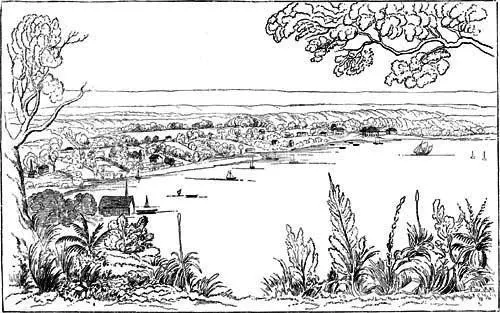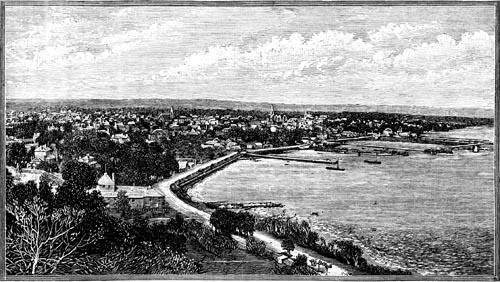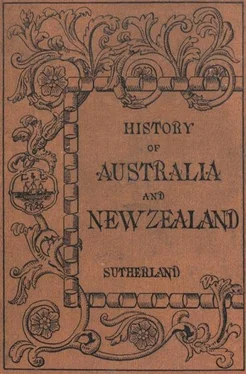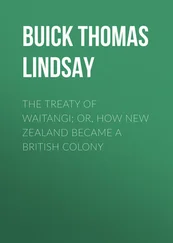CHAPTER XV.
WEST AUSTRALIA, 1829-1890.
1. King George’s Sound.—In 1825, when Sir Ralph Darling was appointed Governor of New South Wales, his commission was supposed to extend over all that part of Australia which lies between the 139th meridian and the eastern coast. Not that the whole of this country, or even the twentieth part of it, was occupied by settlers—the region was merely claimed as British territory. But the remainder of Australia, comprising about two-thirds of the continent, had not, as yet, been annexed by any European nation; and when, in 1826, a rumour prevailed that the French were about to occupy that region, the Sydney people were alarmed lest so great a territory should thus be lost for ever to the British Empire; they, therefore, in that year, sent a detachment of soldiers to take formal possession of the country and to found a settlement at King George’s Sound. From this early effort, however, no practical result ensued; and, during the few years of its existence, the place continued to be nothing more than a small military station.
2. Swan River.—But, in 1827, an English captain, named Stirling, after having sailed along the western coast, gave a most favourable account of a large river he had seen on his voyage. He was not the first discoverer of this river, which, as early as 1697, had been visited by a Dutch navigator, named Vlaming, who was sailing in quest of a man-of-war supposed to have been wrecked on these shores. Vlaming had seen this stream, and, astonished by the wonderful sight of thousands of jet black swans on its surface, had given to it the name of Swan River. But it had remained unthought of till Captain Stirling, by his report, awakened a warm and hopeful interest in this district.
Shortly afterwards the British Government resolved to found a colony on the banks of this river, and Captain Fremantle arrived as the pioneer of the intended settlement. When he landed on the shore, he found that a nearer view of the country was far from realising the expectations formed by those who had viewed it merely from the open sea. He began to have forebodings, but it was now too late—the ships, containing eight hundred of the first settlers, were already close at hand; and, in the course of a week or two, after narrowly escaping shipwreck on the reefs along the shore, they landed Captain Stirling, the first Governor, with his little band, on the wilderness of Garden Island. Here, in this temporary abode, the colonists remained for several months—sheltering themselves in fragile tents, or in brushwood huts, from the rough blasts and the rains that beat in from the winter storms of the Indian Ocean. Exploring parties set out from time to time to examine the adjoining mainland; but, however fair it seemed from a distance, they found it to be merely a sandy region, covered with dense and scrubby thickets. The only port was at a place called Fremantle, where there was but little shelter from the storms of the open ocean; and the only place suitable for a town was several miles up the Swan River, where the waters expand into broad but shallow lagoons. Here the colonists determined to build their city, to which they gave the name of Perth. But the site was not favourable to enterprise; an impassable bar stretched across the mouth of the river, which was, therefore, inaccessible to vessels. The goods of the colonists had to be landed on an exposed beach at Fremantle, and then carried overland through miles of sand and scrub.
In 1830 about a thousand new immigrants arrived; and towards the end of this year the colonists succeeded in settling down in their new homes at Perth.
3. Land Grants.—Most of these immigrants were attracted to Western Australia by the prospect of obtaining large estates; they knew how valuable land was in the well-settled countries of Europe, and, when they heard of square miles in Australia to be had for a few pounds, they were captivated by the notion of so easily becoming great landed proprietors. But the value of land depends upon surrounding circumstances, and ten acres in England may be worth more than a whole wilderness in West Australia. At that time foolish notions were in every quarter prevalent as to what could be done by means of land. The British Government thought it possible to make the colony self-supporting by paying for everything with grants which cost it nothing, but which would be readily accepted by others as payment. Thus the Governor, instead of his yearly salary, was to receive a hundred thousand acres, and all the officials were to be paid in the same manner. The land was distributed in great quantities to people who had no intention of using it, but who expected that, by the progress of colonisation, it would increase enormously in value, and might then be sold for splendid prices.
To induce immigrants to bring with them useful property, the Government offered a bonus of twenty acres for every three pounds worth of goods imported; and the colonists—quite unconscious of the future that lay before them—carried out great numbers of costly, though often unsuitable, articles, by means of which the desired grants were obtained. It was found difficult to convey this property to the town, and much of it was left to rot on the shore, where carriages, pianos, and articles of rich furniture lay half-buried in sand and exposed to the alternations of sun and rain.

Perth, Western Australia, in 1838.

Perth, 1890.
Splendid horses and cattle of the finest breed had been brought out, but they wandered useless in the bush. For, till the country was surveyed, nothing could be done in the way of agriculture; and, even after the surveys were completed, owing to a regulation that those whose grants exceeded a square mile should be allowed the first choice, all the sections nearest to the town were obtained by officials and wealthy speculators, who had no intention of using them. Many of these persons held a district almost as large as an English county, and, therefore, the lands remaining for selection by farmers and small purchasers were generally far in the interior. The sections were pointed out on the maps, but the places themselves had never been trodden by a white man’s foot, and were held by tribes of hostile savages. Some, indeed, tried to settle upon these distant regions, but they were lonely and isolated, and many of them perished, either from disease and hunger, or by the spears of the natives. Yet there were very few who made any attempt at agriculture, and the costly ploughs and implements that had been imported lay rusting on the beach. The horses and cattle died off, the sheep that had been introduced at great expense were almost all killed through feeding on a poisonous plant, which grew in patches over the country; and the men themselves were forced to loiter at Perth, consuming their provisions and chafing at their ruinous inaction.
4. Mr. Peel.—There was one gentleman who had spent fifty thousand pounds in bringing with him to the colony everything that could be required for farming and sheep-breeding on a magnificent scale. He brought with him three hundred labourers; but the land was by no means so fertile as he had imagined, and he had scarcely commenced his farming operations when he found that his only escape from ruin was to enter, single-handed, on the self-dependent life of the ordinary settler.
5. Gloomy Prospects.—Matters grew worse and worse, and those of the disappointed colonists who had sufficient prudence to start before their means were all exhausted either returned to Europe or sought the other colonies, where several achieved success—notably the brothers Henty, who settled at Launceston and established at Portland Bay the whaling station already mentioned. The gloomy reports of those who reached England prevented any further accession of immigrants, and in 1835 it was rumoured, though erroneously, that the British Government intended to abandon the place.
Читать дальше














